In the construction industry, profit margins live and die by the accuracy of your numbers. Miscalculating labor hours, underestimating material costs, or losing track of subcontractor expenses on a single project can erase your profits and damage your firm's reputation. This is where dedicated job costing software for construction becomes an essential tool, moving your financial tracking from reactive guesswork to proactive, data-driven management. Effective cost control isn't just about balancing the books; it's a core component of developing successful strategies for winning tenders, as precise estimates form the foundation of competitive, profitable bids.
This guide is built to help you navigate the crowded market of construction software and find the right solution for your specific needs, whether you're a general contractor, a plumber, an electrician, or a specialized trade technician. We're cutting through the marketing hype to provide a detailed, practical comparison of the top platforms available today.
Instead of generic feature lists, you will find an in-depth analysis of 12 leading job costing tools. For each platform, we provide:
- A clear breakdown of its core functionalities and ideal user.
- Honest pros and cons based on real-world application.
- Detailed pricing information to help you budget effectively.
- Screenshots and direct links to see the software in action.
Our goal is straightforward: to give you the comprehensive information needed to select a tool that will protect your profits, streamline your operations, and give you a clear view of every project's financial health. Let’s dive into the solutions that can transform your cost management.
1. FOUNDATION® Construction Accounting Software
FOUNDATION® Software offers a robust, all-in-one accounting system with a standout job costing module specifically designed for the construction industry. It excels at providing granular control over project financials, making it an excellent choice for contractors who need detailed, real-time cost tracking against budgets. Its core strength lies in its comprehensive approach, integrating payroll, accounts payable, and project management directly with job cost data.
This integration provides a single source of truth, eliminating the need for duplicate data entry and reducing errors. For instance, when you process payroll, labor hours are automatically allocated to the correct job and cost code, giving you an immediate, accurate picture of labor costs. The software is built on Microsoft® SQL Server®, ensuring powerful and reliable data management for detailed reporting.
Key Features & Analysis
- Customizable Cost Codes: You can create and tailor detailed cost code structures that match your company's specific trade and operational needs, whether you're a plumber, electrician, or general contractor.
- Real-Time Reporting: Generate up-to-the-minute reports like over/under billing, work-in-progress (WIP), and committed cost reports to make informed decisions quickly.
- Change Order Management: The system provides a dedicated module for creating, tracking, and approving change orders, ensuring that all cost adjustments are documented and reflected in the project budget.
Practical Considerations
FOUNDATION® is a powerful tool, but its extensive feature set can present a steeper learning curve compared to simpler solutions. New users should anticipate a dedicated implementation and training period to leverage its full capabilities. Pricing is customized based on the modules and number of users required, so you will need to contact their sales team for a personalized quote.
Best For: Mid-to-large-sized construction firms needing a comprehensive accounting and job costing software for construction that can handle complex projects and detailed financial reporting.
Pros:
- Extensive and detailed reporting capabilities.
- Highly customizable to fit various construction trades.
- Integrates multiple business functions into one system.
Cons:
- Can be complex for users new to construction accounting software.
- Pricing is not publicly available and requires a custom quote.
Visit the FOUNDATION® Website: https://with.foundation/software/job-costing/
2. HCSS HeavyJob
HCSS HeavyJob is a specialized job costing software solution designed to give construction project managers and field supervisors clear, real-time visibility into job performance. It excels at collecting field data efficiently and translating it into actionable financial insights. The platform’s main strength is its user-friendly interface, which centralizes critical project data like labor hours, equipment usage, and material quantities, making it easy to track progress against budgets.
This focus on field-to-office communication ensures that decisions are based on the most current information available. For example, a foreman can enter daily time cards and production quantities directly from a tablet in the field, and that data instantly updates project dashboards in the office. This immediacy helps teams identify potential cost overruns early, allowing them to make adjustments before issues escalate. The software is built for heavy civil construction but is adaptable for various trades needing robust field tracking.
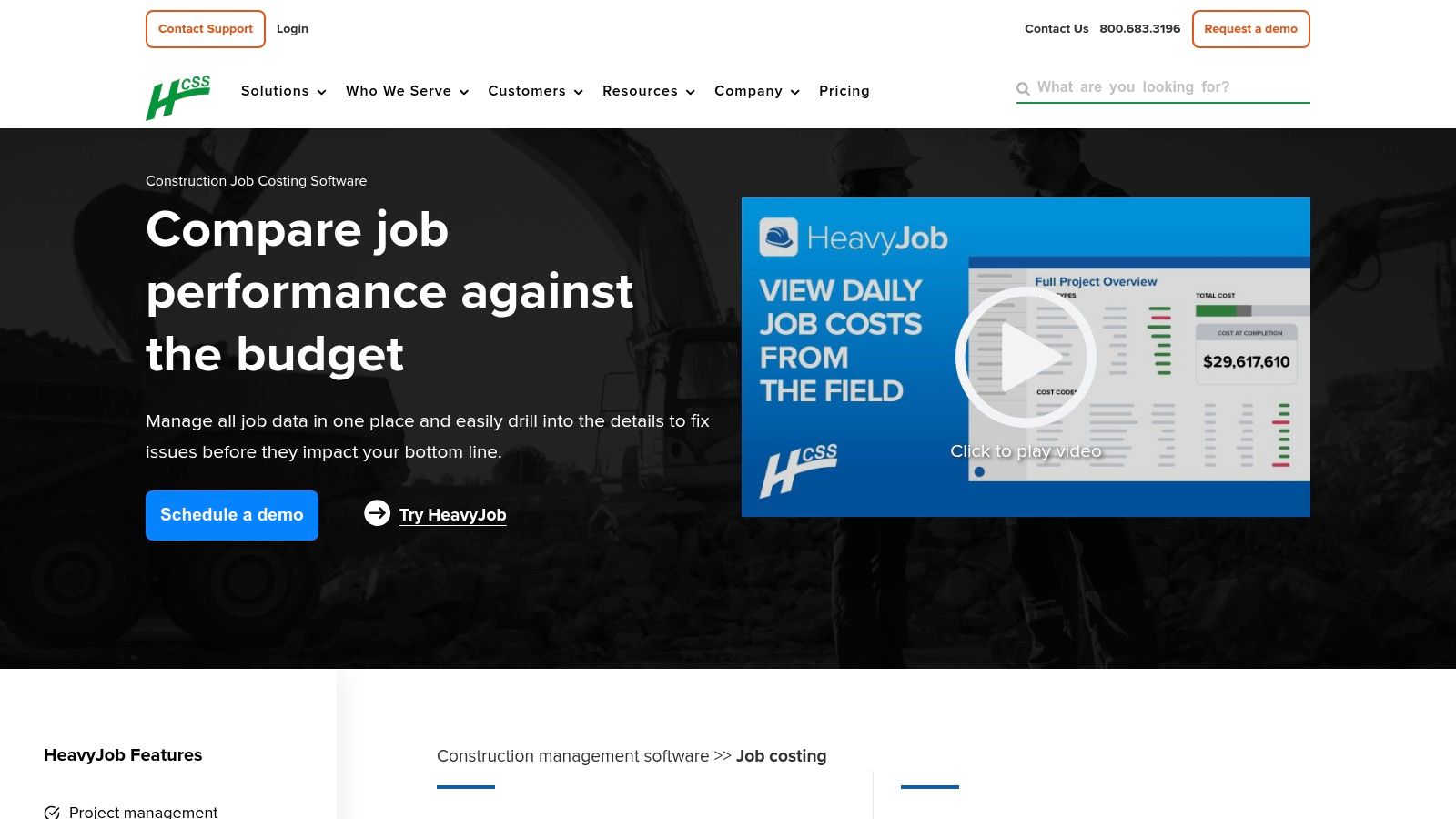
Key Features & Analysis
- Easy-to-Read Dashboards: The platform provides intuitive, visual dashboards that offer a high-level overview of project health, including costs, hours, and production quantities.
- Drill-Down Capabilities: Users can easily drill down from a summary-level report into the specific details of a cost code, right down to individual time card entries or equipment logs.
- Automated Cost Reporting: HeavyJob automates the generation of daily job cost reports, saving time and ensuring consistency in tracking job performance against the original estimate.
Practical Considerations
While HeavyJob is powerful for field data capture and project management, it is not a full accounting system. It is designed to integrate with existing ERP and accounting software, so firms should be prepared for an implementation process that involves setting up these connections. The user experience is highly rated for its simplicity in the field, reducing the training burden on foremen and supervisors. Pricing is provided upon request and tailored to your company's size and needs.
Best For: Heavy civil contractors and firms that prioritize real-time field data collection and need an intuitive tool for project managers to monitor job costs without a steep learning curve.
Pros:
- Excellent, user-friendly interface for field staff.
- Strong real-time data tracking from the job site.
- Powerful visualization and drill-down reporting.
Cons:
- Requires integration with a separate accounting system.
- Integration with other systems may require additional setup and cost.
Visit the HCSS Website: https://www.hcss.com/products/job-costing-software/?utm_source=openai
3. Knowify
Knowify offers a modern, streamlined job costing software for construction, specifically tailored for trade and specialty contractors. Its key advantage is providing real-time visibility into project profitability by simplifying the complex process of tracking costs. The platform is designed to be user-friendly, bridging the gap between field operations and back-office accounting with powerful, accessible tools.
A standout feature is its deep, two-way integration with QuickBooks Online, which automates data flow and eliminates double entry. When your team logs hours or purchases materials in Knowify, the costs are automatically synced and categorized in QuickBooks. This seamless connection ensures financial reports are always accurate and up-to-date, reflecting the true cost of work as it happens.
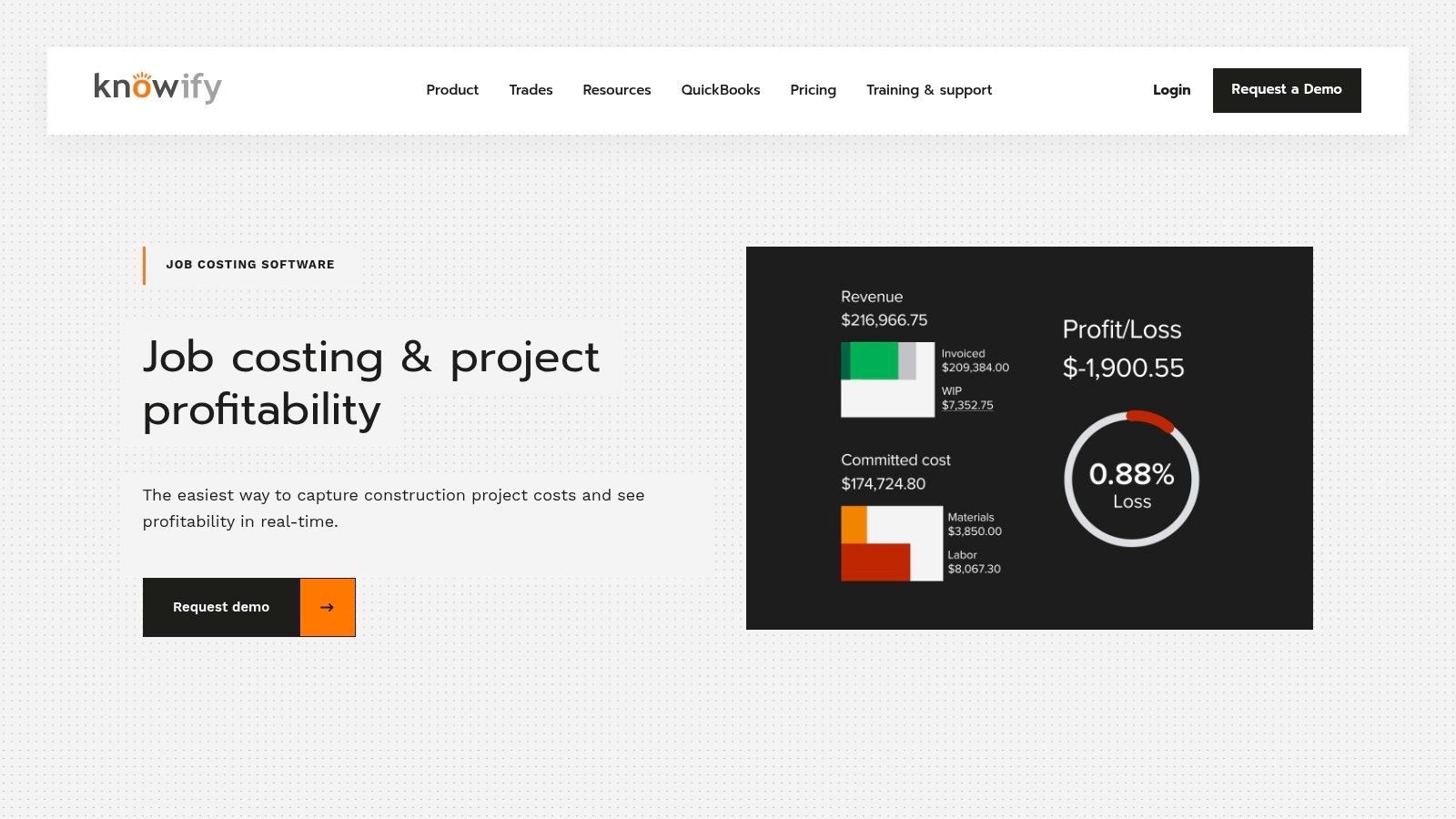
Key Features & Analysis
- Automatic Cost Tracking: Knowify automatically tracks costs for labor, materials, equipment, and subcontractors against the budget in real time, providing an instant profitability snapshot.
- QuickBooks Online Integration: The platform’s premier integration creates a cohesive workflow between project management and accounting, a major plus for businesses already using the QuickBooks ecosystem.
- Real-time Work-In-Progress (WIP) Reporting: Generate accurate WIP reports with a single click, allowing you to understand project financial health and make proactive adjustments.
Practical Considerations
Knowify is exceptionally well-suited for small to mid-sized contractors like plumbers, electricians, and HVAC technicians who need robust job costing without the complexity of a full-scale enterprise ERP. While its feature set is comprehensive for its target audience, very large general contractors managing highly complex, multi-phase projects might find it less scalable than enterprise-level systems. Pricing is transparent and offered in tiered plans, making it accessible for growing businesses.
Best For: Small to mid-sized trade contractors and specialty contractors who use QuickBooks Online and need a powerful, easy-to-use platform to manage project costs and profitability.
Pros:
- Excellent QuickBooks Online integration simplifies accounting workflows.
- User-friendly interface enhances adoption by field and office staff.
- Provides real-time data for quick and informed decision-making.
Cons:
- May lack the depth required for very large construction enterprises.
- Advanced features are locked behind higher-tier subscription plans.
Visit the Knowify Website: https://www.knowify.com/features/job-costing-software/?utm_source=openai
4. Xero
Xero offers a beautifully designed, cloud-based accounting platform that includes accessible job costing software for construction. While not a construction-specific, all-in-one system like others on this list, its strength lies in its user-friendliness and extensive integration capabilities. It allows small to mid-sized contractors to manage project financials, track costs against quotes, and monitor profitability without the complexity of enterprise-level software.
The platform excels at simplifying core accounting tasks. You can assign expenses, purchase orders, and billable time directly to specific projects, creating a clear financial overview for each job. Its cloud-based nature ensures you and your team can access financial data from the office or a job site, facilitating on-the-go decision-making.
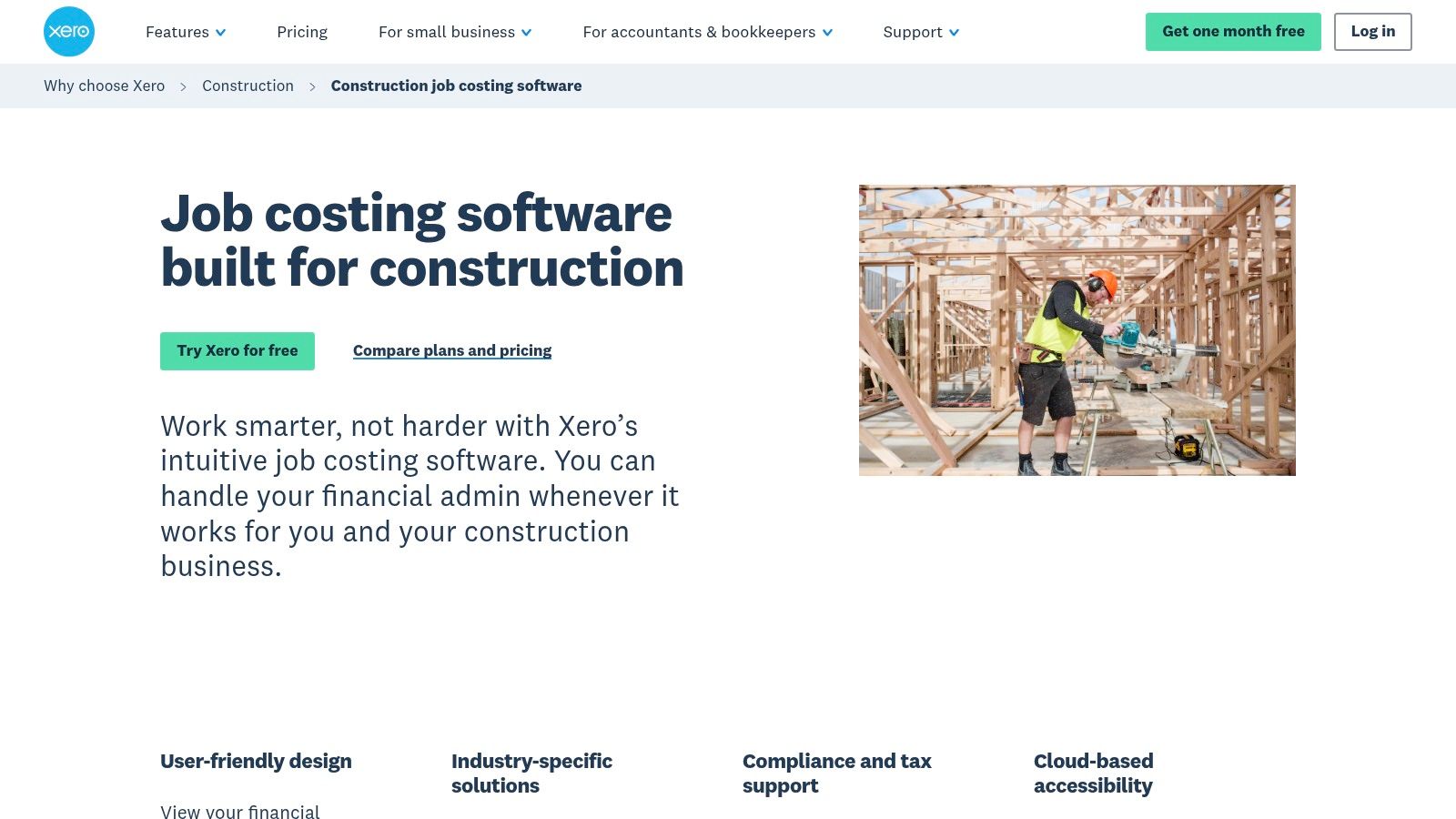
Key Features & Analysis
- User-Friendly Design: Xero's interface is famously intuitive, making it easy for users without deep accounting backgrounds to get started with tracking job costs and profitability.
- Extensive App Marketplace: Xero integrates with hundreds of third-party apps, allowing you to connect specialized construction management tools for tasks like scheduling, estimating, or CRM.
- Cloud-Based Accessibility: Create quotes, send invoices, and check project profitability from any device, which is ideal for contractors who spend most of their time in the field.
Practical Considerations
Xero's core job costing feature, "Projects," is powerful for basic tracking but may lack the granular detail required for complex construction accounting, such as retainage or advanced WIP reporting. Contractors needing these features will have to rely on third-party app integrations, which can add to the overall cost and complexity. Pricing is subscription-based with several tiers, making it scalable for growing businesses.
Best For: Small to mid-sized contractors, remodelers, and tradespeople who need a user-friendly accounting solution with solid job costing capabilities that can grow with their business through integrations.
Pros:
- Extremely easy to use and set up.
- Affordable and flexible monthly pricing plans.
- Vast ecosystem of integrations for specialized construction needs.
Cons:
- Core features lack advanced construction-specific functions like WIP reporting.
- Relies on third-party apps for a complete construction management solution.
Visit the Xero Website: https://www.xero.com/us/small-businesses/construction/job-costing-software/?utm_source=openai
5. ServiceTitan
ServiceTitan is a cloud-based software platform primarily designed for home and commercial service contractors, offering robust job costing features that translate well to certain construction sectors. While its core focus is on service and replacement jobs, its tools for tracking profitability in real-time make it a strong contender for specialty contractors managing multiple, smaller-scale construction projects. It excels at connecting field operations with office administration, ensuring that labor hours, materials used, and equipment costs are captured accurately on-site and reflected instantly in the project's financials.
This seamless flow of information from the field technician's tablet to the back-office accounting dashboard is ServiceTitan's key advantage. For instance, a technician can add materials from their truck inventory directly to a job, and the cost is immediately allocated. This provides an up-to-the-minute view of a project's financial health, a crucial element of effective job costing software for construction.
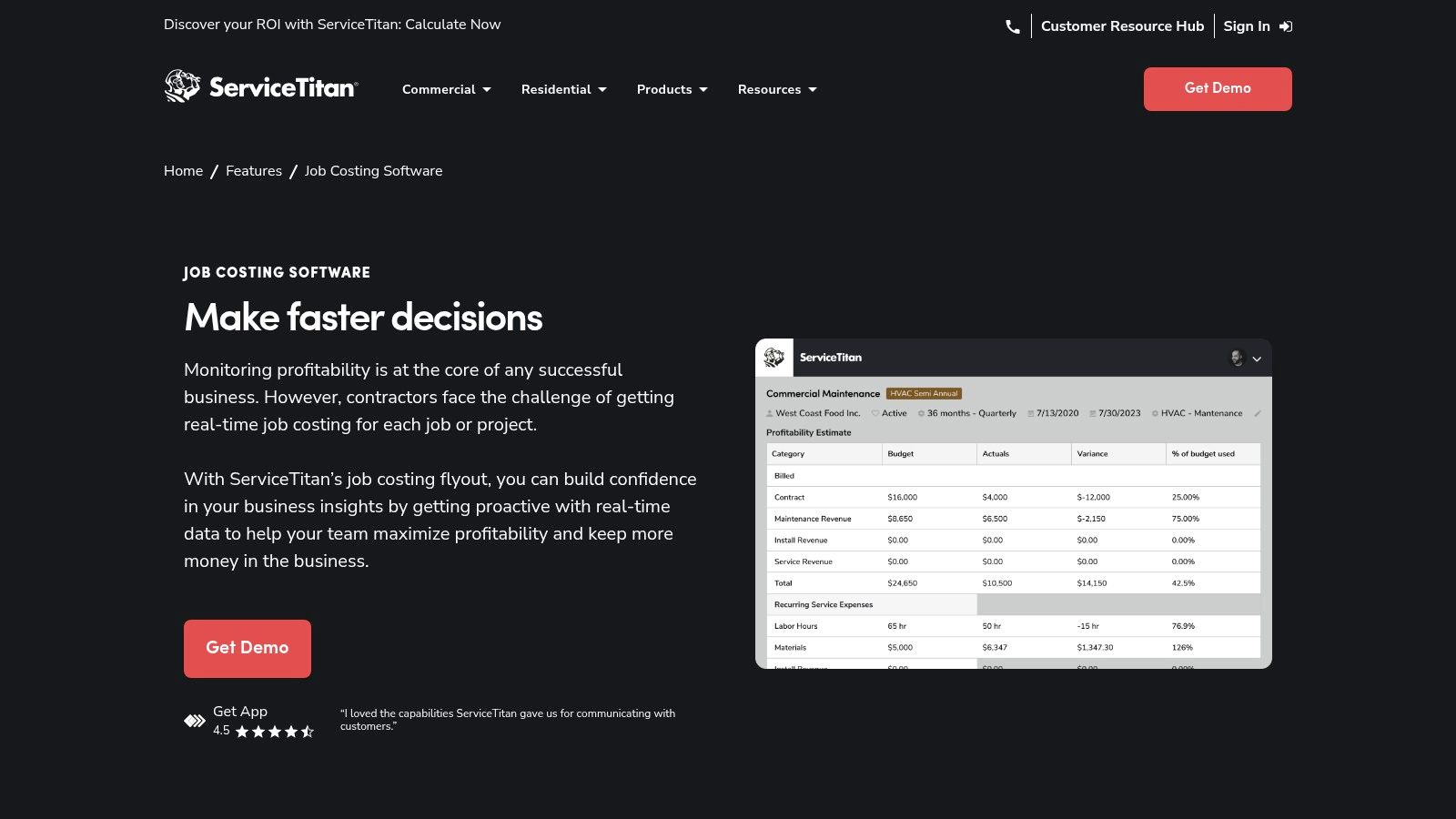
Key Features & Analysis
- Real-Time Job Costing Breakdown: The software provides an immediate breakdown of job costs by category, including labor, materials, and equipment, allowing for instant profitability analysis.
- Project Summary Dashboard: Manage accounts receivable, track cash flow, and view project progress from a centralized dashboard, simplifying financial oversight.
- Detailed Budget Categorization: Use project labels and tags to categorize budgets in detail, enabling more granular tracking and reporting on specific phases or types of work.
Practical Considerations
ServiceTitan's strength in service and maintenance means its construction job costing features are best suited for specialty contractors like HVAC, plumbing, and electrical firms rather than large-scale general contractors. The platform is feature-rich, so new users should expect an implementation period. Pricing is quote-based and tailored to your company's size and needs, so you will need to schedule a demo for a detailed estimate.
Best For: Specialty trade contractors (e.g., HVAC, plumbing, electrical) who handle service, replacement, and smaller construction projects and need a unified field and office management solution.
Pros:
- Excellent mobile app for field technicians.
- Strong integration between field data capture and back-office accounting.
- Provides clear, actionable insights for job profitability.
Cons:
- May be less suitable for large, complex general construction projects.
- Pricing requires a custom quote and can be a significant investment.
Visit the ServiceTitan Website: https://www.servicetitan.com/features/job-costing-software?utm_source=openai
6. Vergo
Vergo is a specialized job costing software for construction designed to provide real-time cost insights by integrating directly with your existing ERP system. It stands out by enhancing, rather than replacing, your core accounting software. Vergo focuses on automating data collection and analysis to give project managers and stakeholders an immediate, clear view of project financial health without manual data manipulation.
The platform's strength lies in its ability to connect with major construction ERPs, pulling financial data automatically to track costs against budgets. This eliminates tedious spreadsheet work and reduces the risk of human error. For instance, as invoices are paid or labor hours are logged in your ERP, Vergo instantly updates its dashboards and reports, providing accurate, up-to-the-minute information for better decision-making.
Key Features & Analysis
- Direct ERP Integration: Vergo connects seamlessly with leading construction ERPs, ensuring that your job cost data is always synchronized with your primary accounting system.
- Automated Job Cost Tracking: The software automates the process of tracking actual costs against budgeted amounts, providing live updates on project profitability and performance.
- Scenario Analysis: A key differentiator is its scenario analysis tool, which allows you to model the financial impact of potential changes or delays before they happen, helping to proactively manage risk.
Practical Considerations
Vergo is designed as an add-on to your existing financial systems, so it's not a standalone accounting solution. Its value is maximized when paired with a compatible ERP. While the integration is powerful, setting it up may require some technical assistance to ensure a smooth connection between systems. The platform is user-friendly once configured, focusing on clear data visualization. Pricing details require direct contact with their sales team for a custom quote based on your specific needs.
Best For: Construction companies already using a major ERP who need a dedicated, real-time job costing and analysis layer to enhance their financial oversight and project management.
Pros:
- Reduces manual data entry and associated errors.
- Enhances team collaboration with shared, real-time data.
- Powerful scenario analysis for proactive financial planning.
Cons:
- Integration setup may require technical assistance.
- Dependent on an existing ERP system to function.
Visit the Vergo Website: https://www.getvergo.com/products/job-costing?utm_source=openai
7. A-Systems JobView®
A-Systems JobView® is a dedicated construction accounting software that places a strong emphasis on detailed job cost reporting. It is engineered to provide contractors with clear visibility into project profitability by rigorously comparing estimated costs against actual expenses. The platform integrates essential construction-specific functions like payroll and billing directly into its job costing core, making it a unified solution for financial management.
This tight integration ensures that data flows seamlessly from one function to another. For example, processing a certified payroll run automatically updates the actual labor costs for the corresponding jobs, providing immediate feedback on budget performance. This makes JobView® a practical choice for contractors who need reliable, in-depth financial data to manage complex projects and maintain compliance.
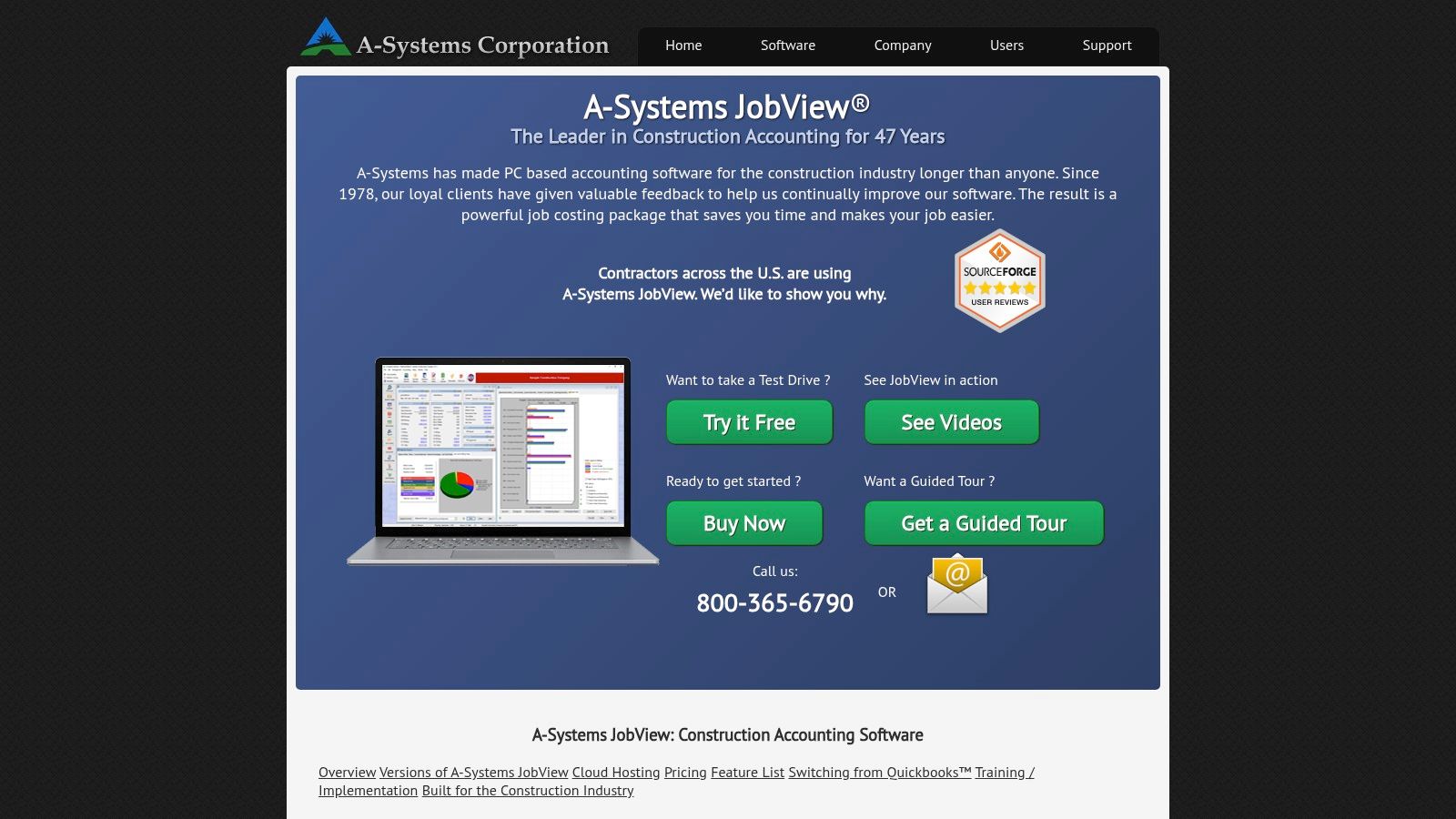
Key Features & Analysis
- Estimated vs. Actual Reporting: The software's core strength is its ability to generate comprehensive reports that show a line-by-line comparison of budgeted costs versus real-time actuals.
- Construction-Specific Payroll: JobView® includes robust payroll features tailored for the industry, such as certified payroll reporting, union reporting, and multi-state processing.
- Change Order Management: Track and manage change orders effectively, ensuring all adjustments to the project scope and budget are accurately documented and billed.
Practical Considerations
While JobView® is a functionally rich platform, some users may find its interface less modern compared to newer, cloud-native applications. However, its straightforward design is often appreciated by users who prioritize function over form. The software is scalable, offering different versions to suit the needs of both small and growing construction businesses. Pricing is customized, so you will need to contact A-Systems for a quote based on your specific requirements.
Best For: Small-to-mid-sized contractors and subcontractors who need a dependable, all-in-one accounting and job costing software for construction with strong payroll capabilities.
Pros:
- Comprehensive feature set specifically for construction accounting.
- Scalable solutions suitable for different business sizes.
- Strong focus on detailed job cost reporting.
Cons:
- User interface may feel outdated to some users.
- Requires contacting the sales team for pricing information.
Visit the A-Systems JobView® Website: https://www.a-systems.net/jobview.htm?utm_source=openai
8. Trimble Viewpoint
Trimble Viewpoint offers a suite of construction management solutions, with its job costing software designed to give contractors precise control over project profitability. It excels at centralizing financial data, connecting the office, team, and field to ensure everyone is working with the most current information. This real-time data access helps contractors manage costs effectively and make proactive decisions to keep projects on track and within budget.
The platform's strength is its ability to provide a comprehensive financial overview from any device. By automating processes like accounts receivable billing and labor cost management, it reduces administrative burdens and minimizes the risk of human error. This automation ensures that as work is completed and costs are incurred, the project's financial health is updated instantly, providing a clear and accurate picture at all times.
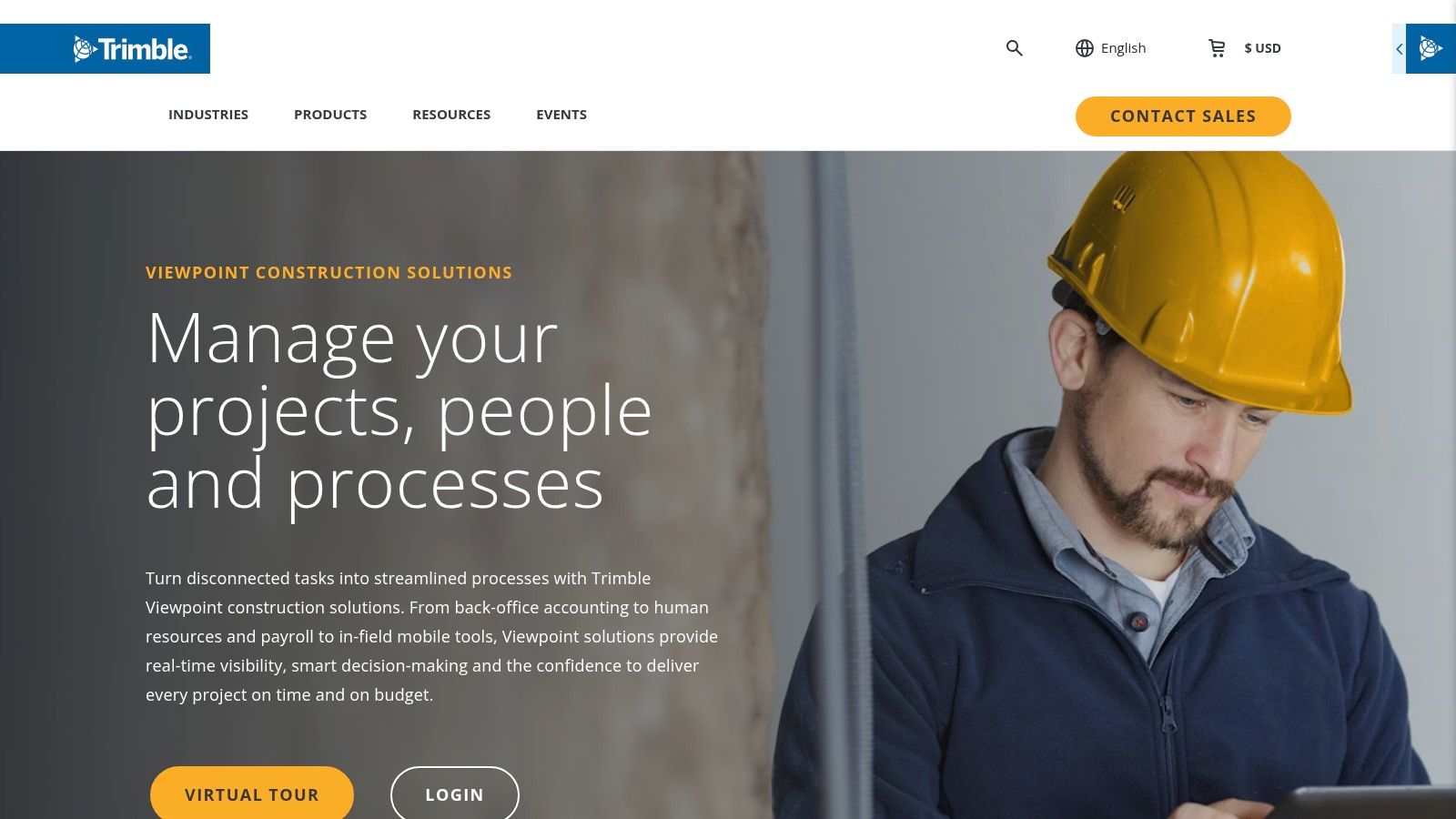
Key Features & Analysis
- Real-Time Job Cost Reporting: Access up-to-the-minute reports from the field or office, allowing project managers to immediately identify and address potential cost overruns.
- Labor Cost Management: Automates the tracking and allocation of labor costs to specific jobs and cost codes, ensuring payroll data accurately reflects project expenses.
- Accurate Financial Reporting: Generates detailed reports that provide deep insights into project health, helping to improve forecasting and strategic planning for future jobs.
Practical Considerations
Trimble Viewpoint is a powerful and expansive ecosystem, and as with many comprehensive platforms, new users should anticipate a learning curve. Proper training and implementation are key to unlocking the full potential of its features. Its product suite is extensive, and pricing is customized based on the specific solutions and scale your business requires, so a consultation with their sales team is necessary to get a quote.
Best For: Growing construction companies and large enterprises looking for a scalable, all-in-one platform that integrates job costing with broader project and financial management.
Pros:
- Excellent real-time data access from any device.
- Strong automation for billing and labor cost management.
- Supports profitable project delivery through accurate reporting.
Cons:
- The extensive feature set may require dedicated training for full utilization.
- Pricing is not publicly listed and requires a custom quote.
Visit the Trimble Viewpoint Website: https://www.viewpoint.com/solutions/construction-job-costing-software?utm_source=openai
9. Sage Construction and Real Estate
Sage Construction and Real Estate offers a suite of powerful financial management tools, with job costing at its core. It is engineered to give contractors precise and timely control over project financials by tracking every dollar from estimate to completion. Sage stands out by providing an integrated ecosystem where accounting, project management, and estimating data converge, ensuring decisions are based on the most current information available.
The platform excels at managing the complexities of construction finance. It meticulously tracks committed costs for materials on order and subcontracted work, preventing budget overruns before they happen. By integrating with daily timesheet collection, it provides an immediate and accurate view of labor costs, a critical component for any construction project’s profitability.
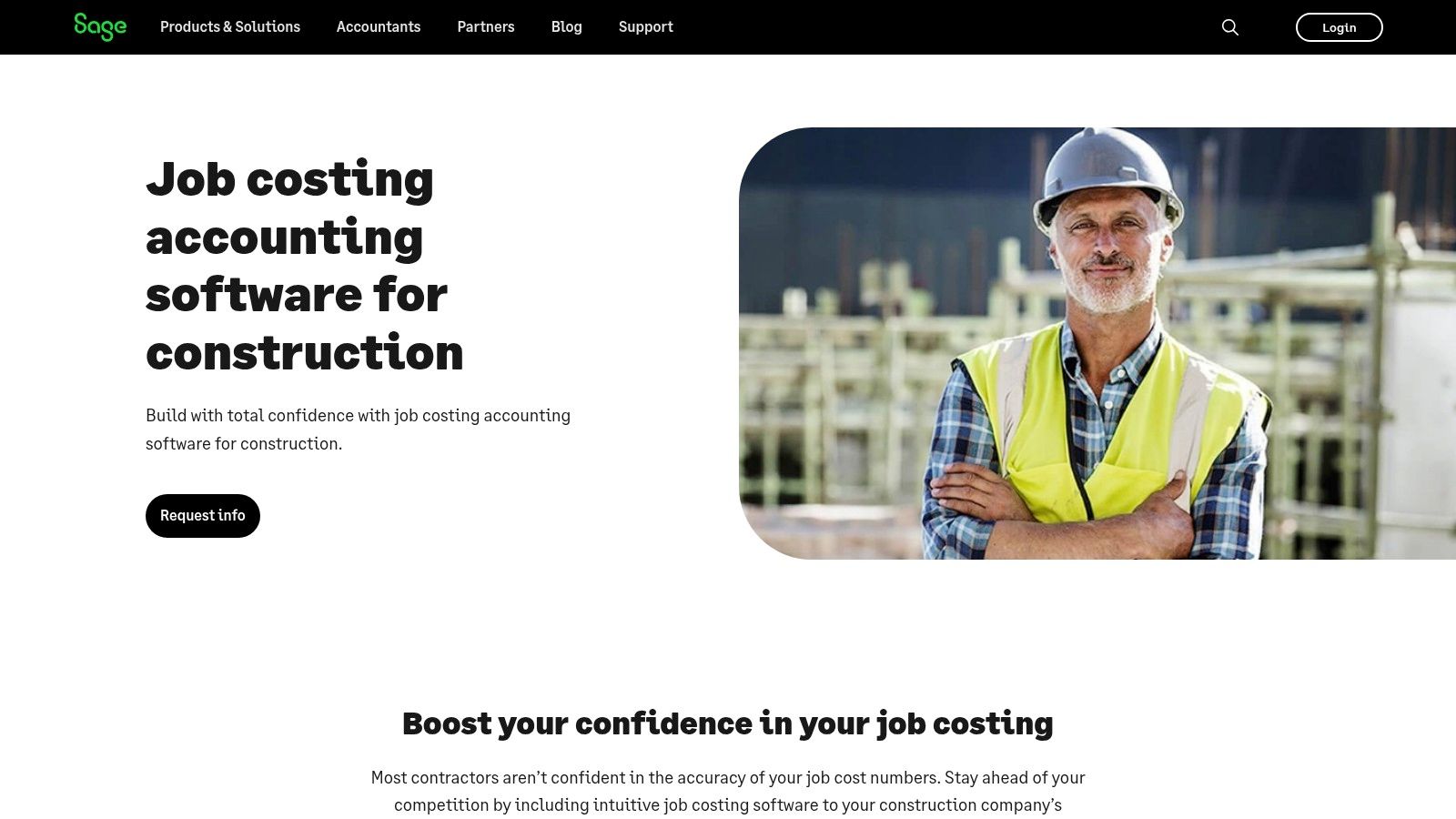
Key Features & Analysis
- Committed Cost and Change Order Tracking: Sage provides robust tools to monitor committed costs that haven't yet hit Accounts Payable, alongside a formal system for managing change orders. This ensures the true cost of a project is always visible.
- Daily Labor Cost Monitoring: By capturing daily timesheets, the software allocates labor expenses to specific jobs and cost codes in real-time, offering up-to-the-minute insight into one of the largest and most variable project costs.
- Automated Alerts: Users can configure automatic alerts for specific cost-related events, such as when a cost code is nearing its budget. This proactive feature helps project managers stay ahead of potential issues.
Practical Considerations
While Sage is a market leader, its comprehensive nature means the initial setup and implementation can be complex and may require specialized consultant support. It is best suited for businesses ready to invest time in training to fully leverage its capabilities. Pricing is tailored to the specific needs and size of the contractor, so you must contact their sales team for a custom quote.
Best For: Small to large construction businesses looking for a proven, scalable, and dedicated job costing software for construction that integrates deeply with their accounting processes.
Pros:
- Improves job cost tracking and overall profitability.
- Offers scalable solutions suitable for various contractor sizes.
- Strong integration between accounting and project operations.
Cons:
- Initial setup and implementation can be a complex process.
- Pricing requires a direct consultation and is not publicly listed.
Visit the Sage Construction and Real Estate Website: https://www.sage.com/en-us/sage-construction-us/job-costing/?utm_source=openai
10. CHS Software
CHS Software is an all-in-one accounting and job costing solution tailored specifically for high-end custom home builders. It stands out by combining comprehensive, builder-specific financial tools with features designed to enhance client trust through professional reporting. The platform's core strength is its ability to centralize all financial data from estimates, purchase orders, and change orders into a single, cohesive system.
This unified approach ensures that every member of the team, from project managers to accountants, is working with the same real-time information. For custom builders, this means generating polished, accurate financial reports is straightforward, which helps build confidence with discerning clients. The system is designed to provide a clear, detailed financial narrative for each unique home project, making it a specialized tool for this niche market.
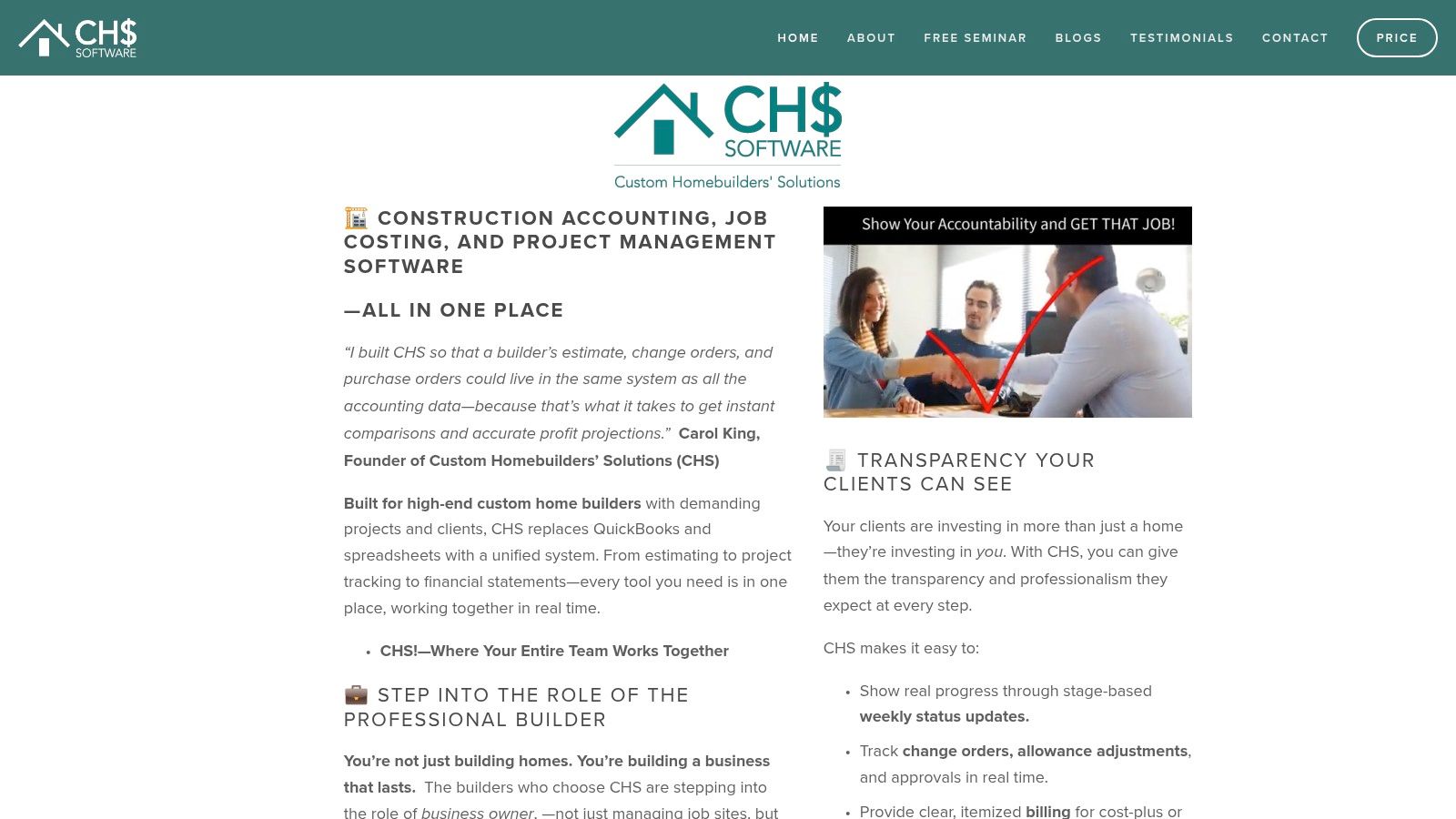
Key Features & Analysis
- Builder-Specific Financials: The software is built from the ground up for the custom home building process, tracking everything from initial bids to final profit margins.
- Unified Team Collaboration: All project data lives within one platform, which streamlines communication and ensures financial accuracy across estimates, POs, and client-approved change orders.
- Professional Client Reporting: Generates clean, easy-to-understand financial reports that can be shared with clients to provide transparency and build trust throughout the construction process.
Practical Considerations
CHS Software's deep focus on custom home building makes it a perfect fit for that segment, but its features may not be broad enough for large-scale commercial contractors or specialty trades with different operational needs. The platform offers flexible subscription options without requiring long-term commitments, allowing builders to scale their usage as needed. This flexibility is a significant advantage for smaller or growing firms that want powerful job costing software for construction without a hefty initial investment.
Best For: Small to mid-sized custom home builders who need a dedicated job costing and accounting platform to manage unique projects and maintain client transparency.
Pros:
- Highly tailored for the custom home building industry.
- Flexible subscription options with no long-term contracts.
- Excellent for creating professional, client-facing financial reports.
Cons:
- Niche focus may not be suitable for commercial or industrial projects.
- Lacks the extensive module variety of larger, enterprise-level systems.
Visit the CHS Software Website: https://chssoftware.com/?utm_source=openai
11. Procore
Procore is a comprehensive, cloud-based construction management platform that brings every aspect of a project, from the field to the office, into a single unified system. While not a standalone accounting package, its financial management tools provide powerful job costing software for construction by connecting project execution data directly to financial outcomes. Procore excels at facilitating communication and data flow between all stakeholders, ensuring that cost data is live and transparent.
Its core strength is its all-in-one nature, linking daily logs, RFIs, and change orders directly to the budget. This means when a superintendent logs labor hours on-site via the mobile app, that data is immediately available to the project manager for cost analysis. This seamless integration eliminates the data silos that often cause budget overruns and delays, providing a real-time financial pulse on every project.

Key Features & Analysis
- Unified Financials & Project Management: Connects field activities like daily reports and timecards directly to the project budget, providing real-time cost visibility.
- ERP Integration Marketplace: Procore’s standout feature is its ability to integrate with dozens of leading accounting systems (like Sage, Viewpoint, and QuickBooks), allowing you to keep your existing ERP while gaining best-in-class project management.
- Change Order Management: Provides a structured workflow for creating, pricing, approving, and tracking change orders, ensuring all cost impacts are captured and reflected in the main budget.
Practical Considerations
Procore is an enterprise-level platform, and its pricing reflects its extensive capabilities. It can be a significant investment, making it less suitable for smaller contractors. Implementation requires careful planning, especially when integrating with an existing accounting system, to ensure data maps correctly. The platform's true power is unlocked when all project team members, including subcontractors, actively use it.
Best For: General contractors and large specialty contractors managing multiple complex projects who need a unified platform to connect field operations with financial oversight and collaborate across the entire project team.
Pros:
- End-to-end construction management in a single platform.
- Excellent collaboration tools for field and office teams.
- Extensive integration capabilities with other software via its App Marketplace.
Cons:
- Pricing can be a significant investment for smaller businesses.
- The sheer number of features can be overwhelming without proper training.
Visit the Procore Website: https://www.procore.com/
12. B2W Software
B2W Software provides a specialized suite of tools tailored for the heavy construction industry, offering a unified platform for estimating, field tracking, maintenance, and job costing. Its primary advantage is the modular approach, allowing contractors to build a system that fits their specific operational needs. The platform excels at connecting field operations directly with back-office financial management, ensuring data flows seamlessly from the job site to the budget.
This direct line of communication is crucial for heavy civil projects where equipment and labor costs fluctuate daily. For instance, the B2W Track module allows field crews to log labor hours, equipment usage, and production quantities directly on a tablet, which then syncs with the system to provide real-time cost data. This makes it an exceptional piece of job costing software for construction firms managing large fleets and complex projects.
Key Features & Analysis
- Modular Platform: Contractors can select and implement specific modules like B2W Estimate, B2W Track, and B2W Maintain as needed, creating a customized solution.
- Heavy Equipment Focus: Includes robust features for equipment maintenance scheduling, dispatching, and cost tracking, which is critical for asset-heavy businesses.
- Field Data Integration: B2W Track provides powerful field log capabilities, capturing performance data against the original bid to provide real-time job cost analysis.
Practical Considerations
B2W is designed with the complexities of heavy construction in mind, which means it may be overly robust or complex for smaller residential or specialty contractors. The modular design adds flexibility, but full implementation across all modules requires significant investment in both cost and training. Pricing is provided through a custom quote based on the selected modules and company size.
Best For: Heavy civil, highway, and utility contractors who need a powerful, integrated platform to manage estimating, field operations, and equipment maintenance alongside job costing.
Pros:
- Excellent for heavy construction and asset-intensive businesses.
- Modular design allows for a scalable, tailored solution.
- Strong integration between field data capture and financial analysis.
Cons:
- Can be too complex and costly for smaller contractors or different trades.
- Pricing is not transparent and requires a direct sales inquiry.
Visit the B2W Software Website: https://www.b2wsoftware.com/
Job Costing Software Feature Comparison
Final Thoughts
Navigating the crowded market of job costing software for construction can feel like framing a complex structure without a blueprint. However, as we've explored, the right digital tool is no longer a luxury but a foundational element for profitability and operational efficiency in the modern trades. Moving beyond manual spreadsheets and disconnected systems is the single most impactful step you can take to gain clarity on where every dollar is earned and spent.
The key takeaway is that there is no one-size-fits-all solution. A large-scale general contractor using a tool like Trimble Viewpoint or Sage Construction and Real Estate has vastly different needs than a specialized electrical or HVAC business that might thrive with a platform like ServiceTitan or Knowify. Your choice must be a direct reflection of your business's unique scale, complexity, and growth ambitions.
How to Choose the Right Software for Your Business
Making the final decision requires a structured approach. Before you sign any contract or commit to a lengthy implementation, work through these critical steps to ensure the software you choose aligns perfectly with your operational reality.
- Step 1: Define Your Core Problem. Are you primarily struggling with inaccurate labor tracking in the field? Is materials cost leakage your biggest issue? Or is the disconnect between accounting and project management causing delays? Pinpoint your most significant pain point. A platform like HCSS HeavyJob excels at field data capture, while a system like FOUNDATION® offers deep accounting integration.
- Step 2: Map Your Existing Workflows. Document how your team currently handles estimates, purchase orders, time tracking, and invoicing. Which steps are manual? Where do bottlenecks occur? This map will be your guide for evaluating how a new system will fit in, replace, or improve your current processes.
- Step 3: Involve Your Team Early. The people who will use the software daily, from field technicians to office administrators, must be part of the evaluation process. Their buy-in is critical for successful adoption. Let them participate in demos to assess usability and provide feedback on how the tool would impact their day-to-day tasks. Their perspective on a tool like B2W Software versus Procore could reveal crucial usability differences.
- Step 4: Prioritize Integrations. Your job costing software for construction does not operate in a vacuum. Consider how it will connect with your existing accounting software (like Xero or QuickBooks), payroll services, and any other critical business systems. Seamless integration prevents the dreaded double-entry of data and ensures a single source of truth across your company.
The True Cost of Implementation
Remember, the price tag of the software is only one part of the total investment. Implementation itself is a project that requires dedicated resources. You must account for the time and costs associated with data migration, team training, and the initial learning curve. A phased rollout, starting with one or two key features or a pilot team, can often smooth this transition and build momentum for wider adoption.
Choosing the right job costing software for construction is a strategic decision that will pay dividends for years to come. By moving from reactive problem-solving to proactive, data-driven management, you empower your business to bid more accurately, manage projects more profitably, and build a sustainable foundation for future growth. The clarity you gain isn't just about numbers; it's about control over your company's destiny.
Are your technicians spending too much time searching for parts information and not enough time on the job? Complement your new job costing software with Nora, an AI-powered search tool that gives your field team instant access to technical manuals and parts data. Empower your technicians to solve problems faster and improve first-time fix rates by visiting Nora today.











